Empowering Women in Tech is an interview series by Templeton & Partners aimed at women in the tech field to share their experiences, learn from and get inspired by one another.
For our latest Empowering Women in Tech, we interviewed Maya Jantchi, a versatile Scrum Master and coach, an agile enthusiast and a proud mother of two from Amsterdam. Maya has been in the tech field for more than 20 years, leading international teams in digital transformation. We caught up with her to talk about diversity, learn from her inspiring journey, and get her opinion and advice on how women can navigate and progress their careers in tech, a primarily male-dominated industry.

Maya, can you share a little bit about your journey in tech?
I've been working as a Scrum Master and Agile Coach for about 14 years, but for the past eight years, I've been working more in agile transformation. My dive into tech started during university when I studied International Business Management in Newcastle, UK. My educational background was not tech related, so I had to learn everything in practice on the go. So, while I was pursuing my bachelor's degree, I was also working at an organisation where I was responsible for setting up the whole intranet. That was my first experience in the field and where my love for all the technical stuff started. That should be more than 20 years ago.
What influenced you to pursue a career in IT, and what do you think is the most exciting part of your job?
Technology is constantly evolving, and that fascinates me. I get to work on cool stuff, build cool stuff from scratch and see the results of my hard work actually help other people do things better, quicker and cooler. I think that's pretty amazing. The ability to build it in tech is unparalleled, and the impact my work can have on people's lives is what really keeps me here. When I started 20 years ago, things were completely different. Now everything's changing so fast, and you need to stay on top of these developments by being flexible and learning exciting new technologies all the time.
You work in a male-dominated industry. What is it like to be a woman working in technology for you? Do you see any challenges in certain aspects of your job related to your gender?
There are more men than women in the industry – that's a fact. However, I think this is changing over the years. Nowadays, you see more women in the workplace, but certainly, there is still much room for improvement in reaching gender equality.
However, one of the great things about technology is that, as a field, it is incredibly vast, flexible, and suits a range of talents and skill sets. There are many opportunities for all within technology, but sometimes they won't just come your way – you need to grasp them. Apart from the IT skills many roles require, adaptability is also an essential skill you need to succeed in the field. Moreover, you need to be a person who is not afraid to take the initiative, even in a male-dominated environment. You should see that as a challenge you need to overcome.
I've been fortunate enough to never have experienced discrimination when working with men, nor have I been involved in or witnessed a situation where women were mistreated because of their gender. On the contrary, there was a lot of respect, and I enjoyed working with men and women equally. I have had a positive experience in terms of that, and I wish all women felt respected and treated fairly in their workplaces. I also hope women will get more chances but also take those chances.
Why do you think there is still a lack of female professionals in tech? What can we do to encourage more women to enter the field?
Fortunately, there are a few things we can do. I believe role models and real-life examples are essential for both genders to understand what women have to offer in every field. For instance, a woman from a leadership role could set an example and also inspire others to work in the tech sector. Female leaders should have more visibility to help other women build their confidence in the industry and show them that they do belong there.
From a position of power, it's also easier to help other women in the workplace by allowing their voices to be heard, becoming their coach or mentor or engaging male allies in creating a better and safer environment for everyone to grow equally.

Have you noticed a gender pay gap in the industry? Why do you think this is happening, and what initiatives would you recommend to close this gap?
To be honest, I'm not sure I can answer this question as I'm not aware of the numbers or the statistics on this matter. However, if research shows a gender pay gap in tech, I can see why for a couple of reasons. Firstly, since women are underrepresented in most industries – particularly in leadership positions – it's up to men to make the decisions, and it makes sense that these decisions are more favourable to them. In addition, men tend to be more direct; if they want a raise in their salary, for example, they will just ask for it. On the other hand, women often lack the confidence to stand up for themselves or even feel unworthy.
Regardless of gender, we all deserve equal pay for the same job. And if this gap exists in the industry, there is an urgent need to close it. If you want something, you feel you are being treated unfairly, or you think you earn less than your colleague for no reason, whether you're a woman or a man, you should stand up for yourself and simply say it to your managers.
Organisations should also be responsible for closing the gender pay gap by setting up initiatives, like having an equal number of male and female representatives on the board, for example. Moreover, having more women in leadership positions and technical roles, I know from personal experience, can be really helpful.
Maya, you said earlier that women often don't feel worthy. Have you heard of the "imposter syndrome", the dominant feeling of which is a constant fear of being exposed as a fraud? Why do you think this is more common for women in tech, and have you ever felt this way?
Maybe I experienced something similar at the beginning of my career. As a perfectionist, I always wanted to deliver good work and deliver fast. I used to believe this was the only way to succeed and grow your career. So, many times I would push myself to do a flawless job. But, since being perfect all the time is simply impossible, the thought of not being good enough would come up, and I would often wonder whether I was doing the right thing.
Inevitably, at some point, you get more experienced in your field – and life, in general – and you realise that you're already doing a good job and have achieved so many things. Suddenly you start feeling more confident about yourself and prouder of your accomplishments.
As a woman that has experienced something like that, what would you advise other women that may also feel this way?
I would say to them to have their eyes on the ball: Focus on what you really want to achieve, and don't let yourself get distracted by irrelevant things. Many stupid things, thoughts, or even people might come in the way and obstruct your progress towards your goals. They can distract you, bring you down, and make you feel insecure or unworthy. Don't allow this to happen. Obviously, that's easier said than done, but you need to have a little faith in yourself that you can pull it off.
Most importantly, stop worrying so much about everything. We are humans, and we make mistakes. Especially when you have to juggle so many different things simultaneously – job, family, hobbies, social life – it's hopeless and absurd to seek perfection. There are so many things you can't control that can go sideways. So try to give yourself a break every now and then, focus on what really matters to you the most, relax and enjoy the ride.

What do women need to stay and succeed in tech? - Women in IT: Creating a Future for Female Tech Leaders
You're a mother of two, a wife and a successful professional in a very responsible position. How do you manage to maintain a healthy work-life balance? What's your secret?
That's not always an easy task. In my experience, having some kind of structure in your day can be quite helpful. So my advice would be to make sure you plan everything ahead, but also keep your cool if something doesn't go as planned. Stressful situations are part of the deal called life, and sometimes the best approach is to go with the flow – take some nice deep breaths and take it from there.
Who inspired you as a female role model growing up, and how did they impact your career or life?
There wasn't a specific person, but I do admire all professional athletes – their determination to win, the confidence they display even in unexpected situations, their self-discipline and focus on their goal, and their ability to stay positive even after a loss. These characteristics are not restricted to sports. I like to think of my workplace as a playing field where I try to embody as many of these qualities as possible, especially the athletic mindset, which helps me see what I want to achieve and what it takes to go after it.
What do you consider the standout skills and characteristics of someone who wants to succeed in the technology sector?
Tech is such an exciting industry to be part of, combining innovation, creativity and problem-solving. You get to build and deliver great stuff and have fun while working. I wouldn't want to work anywhere else. However, to work and be successful in the field, you need to be a little adventurous. The sector is evolving so fast, and you never know what new technology will influence the creation of another. You'll always need to be ready to switch tools, methodologies, working environments, and even ways of thinking. But as long as you love the thrill and keep an open mind, you should be fine.
What is the most valuable career advice you had ever received or wished somebody had given you when you started out?
I wish someone had taught me the importance of maintaining a healthy work-life balance earlier in my career. When you're young, you have so much ambition to get to the top, and you also have the stamina to work long days, nights or even weekends towards achieving your career goals. But even if you put in the hard work, that's not a guarantee of success and, not long after, you realise that "living for the weekends" can only take you so far.
Work shouldn't be what life's all about. It is definitely a fundamental part of how we live, but there are other things to live for. In order to lead a happy and healthy life, balance is key: Make the most out of your career while living life to the fullest. Find a job that you enjoy, take regular holidays to switch off from work, do sports, make time for your family and friends, travel more, meet new people, and exchange new ideas and perspectives. In other words, don't let life pass you by. Otherwise, you'll end up living your entire life in your little work bubble – that sounds pretty depressing to me.
A big thank you to Maya for a great interview.

From the same series - Empowering Women in Tech – An Interview with Thérèse Struik
Maya’s inspirational story highlights the importance of celebrating other female tech leaders who have paved the way for some of the greatest innovations of history and are changing the world right now.
Tech's Most Influential Women Throughout History
Tech is and has always been a notoriously male-dominated space. According to a global software developer survey in 2022, the vast majority of developers are males (accounting for more than 90% of all respondents), while less than 6% were female, demonstrating once again the male-dominated nature of the tech industry. However, despite always being underrepresented in I.T. professions, women have made massive technological contributions over the years.
Women Who Changed the World of Tech:
-
Ada Lovelace – The World's First Computer Programmer
Ada Lovelace made her mark on the world at a time when women were uncommonly involved in STEM disciplines, and computers, as we know them today, didn't even exist.
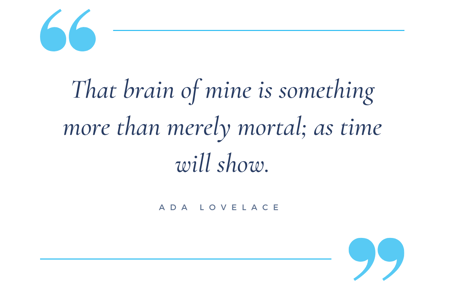 Born in 1815, Ada was the daughter of the romantic poet Lord Byron and his wife, Anna Isabella-Byron. She was a home-schooled child by her mother, who insisted she was taught science and mathematics. Ada showed remarkable talent for mathematics from a very young age, and what fascinated her the most were the human brain and machines. In 1833, Lovelace met Charles Babbage, the inventor of the Analytical Engine, a complicated computing machine that resembled the elements of a modern computer. Ada invented an algorithm that allowed Babbage's engine to compute Bernoulli numbers, which turned out to be the first computer algorithm ever published.
Born in 1815, Ada was the daughter of the romantic poet Lord Byron and his wife, Anna Isabella-Byron. She was a home-schooled child by her mother, who insisted she was taught science and mathematics. Ada showed remarkable talent for mathematics from a very young age, and what fascinated her the most were the human brain and machines. In 1833, Lovelace met Charles Babbage, the inventor of the Analytical Engine, a complicated computing machine that resembled the elements of a modern computer. Ada invented an algorithm that allowed Babbage's engine to compute Bernoulli numbers, which turned out to be the first computer algorithm ever published.
Lovelace's notes on the Analytical Engine also inspired Alan Turing's work on the first modern computer. Ada is known to be the world's first programmer and is even considered by many as the Prophet of the Computer Age. Every second Tuesday in October is known as Ada Lovelace Day, honouring women in STEM careers.
-
Hedy Lamarr – The Inventor of Wi-Fi
In the 1940s, Hedy Lamarr was considered one of the most sought-after female actresses and a beautiful Hollywood star. In reality, she was so much more than meets the eye. Away from the cameras, her passion for innovation spawned the wireless communication technology as we know it today.
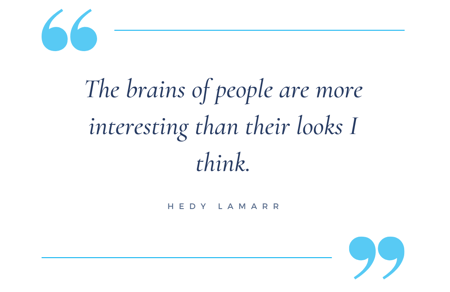 In 1942 Hedy was awarded a patent for her "secret communication system", a radio-based torpedo guidance system that was immune to jamming, designed with the help of another inventor, George Antheil. This system was intended as a way to set radio-guided torpedoes off course during the war. Still, only a few people took the actress seriously, and her patent eventually expired without ever being used in the real world. However, Lamarr and Antheil's idea eventually inspired many of our essential technologies today, including Wi-Fi, GPS and Bluetooth technology.
In 1942 Hedy was awarded a patent for her "secret communication system", a radio-based torpedo guidance system that was immune to jamming, designed with the help of another inventor, George Antheil. This system was intended as a way to set radio-guided torpedoes off course during the war. Still, only a few people took the actress seriously, and her patent eventually expired without ever being used in the real world. However, Lamarr and Antheil's idea eventually inspired many of our essential technologies today, including Wi-Fi, GPS and Bluetooth technology.
In 2014, Lamarr and Antheil were inducted into the National Inventor's Hall of Fame.
-
Annie Easley – One of the First Black NASA Rocket Scientists
Annie Easley was a brilliant coder and mathematician, an activist for gender and racial diversity in STEM, and an inspiring role model.
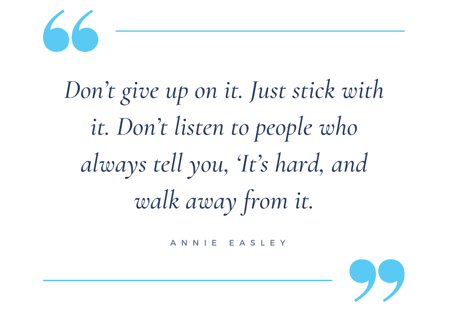 Annie began her career at NASA in 1955 as a human computer, performing complex mathematical calculations. When human computers were replaced by machines, Easley evolved along with the technology. Using languages like Formula Translation System (Fortran), she supported NASA's programs as an adept computer programmer. In addition to developing and implementing code, she studied alternative power technology, including the battery technology used for early hybrid vehicles and the Centaur upper-stage rocket. Her contributions to the Centaur project laid the technical foundations for future space shuttle launches, including the 1997 launch of Cassini to Saturn.
Annie began her career at NASA in 1955 as a human computer, performing complex mathematical calculations. When human computers were replaced by machines, Easley evolved along with the technology. Using languages like Formula Translation System (Fortran), she supported NASA's programs as an adept computer programmer. In addition to developing and implementing code, she studied alternative power technology, including the battery technology used for early hybrid vehicles and the Centaur upper-stage rocket. Her contributions to the Centaur project laid the technical foundations for future space shuttle launches, including the 1997 launch of Cassini to Saturn.
When hired, Easley was one of only four black employees at NASA. Later in her career, she became an Equal Employment Opportunity (EEO) counsellor at NASA, addressing the issues of gender, race, and age discrimination within the organisation.
Inspiring Women in the New Era of Technology:
-
Reshma Saujani – Founder & CEO of Girls Who Code
A graduate of the University of Illinois, Harvard, and Yale, Reshma Saujani began her career as an attorney and activist.
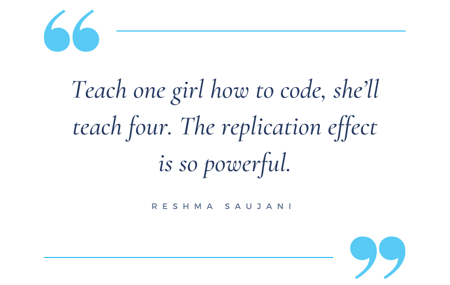 In 2010, Saujani became the first Indian-American woman to run for U.S. Congress. During the race, she visited many schools, where she had the chance to see first-hand the gender gap in computer classes. This influenced her to found Girls Who Code in 2012, an international non-profit organisation to close the gender gap in the tech workforce. The organisation supports girls between the ages of 13 and 17, providing summer immersion, campus programmes, online resources, books, after-school clubs, and college alums programmes. Since its inception, the organisation has served more than 450,000 girls, approximately half of whom come from underserved communities.
In 2010, Saujani became the first Indian-American woman to run for U.S. Congress. During the race, she visited many schools, where she had the chance to see first-hand the gender gap in computer classes. This influenced her to found Girls Who Code in 2012, an international non-profit organisation to close the gender gap in the tech workforce. The organisation supports girls between the ages of 13 and 17, providing summer immersion, campus programmes, online resources, books, after-school clubs, and college alums programmes. Since its inception, the organisation has served more than 450,000 girls, approximately half of whom come from underserved communities.
In 2017, Saujani published her book, Girls Who Code: Learn to Code and Change the World, promoting the tenets of her organisation, and to date, she continues to advocate for young girls and women in tech with her award-winning podcast Brave, Not Perfect.
-
Whitney Wolfe Herd – Founder & CEO of Bumble
Whitney Wolfe Herd is a tech billionaire making a difference in the world of dating and technology by putting women first.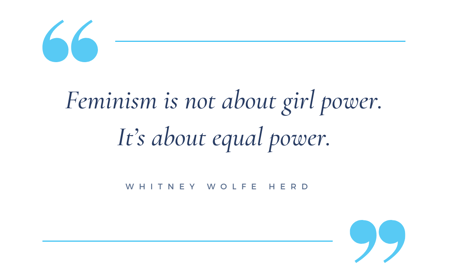 Before founding Bumble and becoming the world's youngest self-made female billionaire, Wolfe Herd was the V.P. of marketing at Tinder but left the company after she was sexually harassed and discriminated against. Without even having a STEM degree, she created and successfully led a game-changing dating app that allows only women to make the first move and initiate a conversation in heterosexual matches.
Before founding Bumble and becoming the world's youngest self-made female billionaire, Wolfe Herd was the V.P. of marketing at Tinder but left the company after she was sexually harassed and discriminated against. Without even having a STEM degree, she created and successfully led a game-changing dating app that allows only women to make the first move and initiate a conversation in heterosexual matches.
Yet that's not the only thing that sets Bumble apart from its competitors. Among other things, the company took a stand against body shaming, worked with Texas legislators to outlaw the unsolicited sending of lewd images, and shows no tolerance for misogyny on its platform.

Our Diverse and Inclusive Approach to Recruitment
Templeton has over 26 years of experience recruiting highly skilled and diverse I.T. contractors across the world – find out more about our award-winning tech recruitment services.
Are you looking for a role in IT?
We provide contract tech jobs in 40 countries worldwide, and our diverse, international team is on a mission to find the right one for you. Get in touch with us today!




